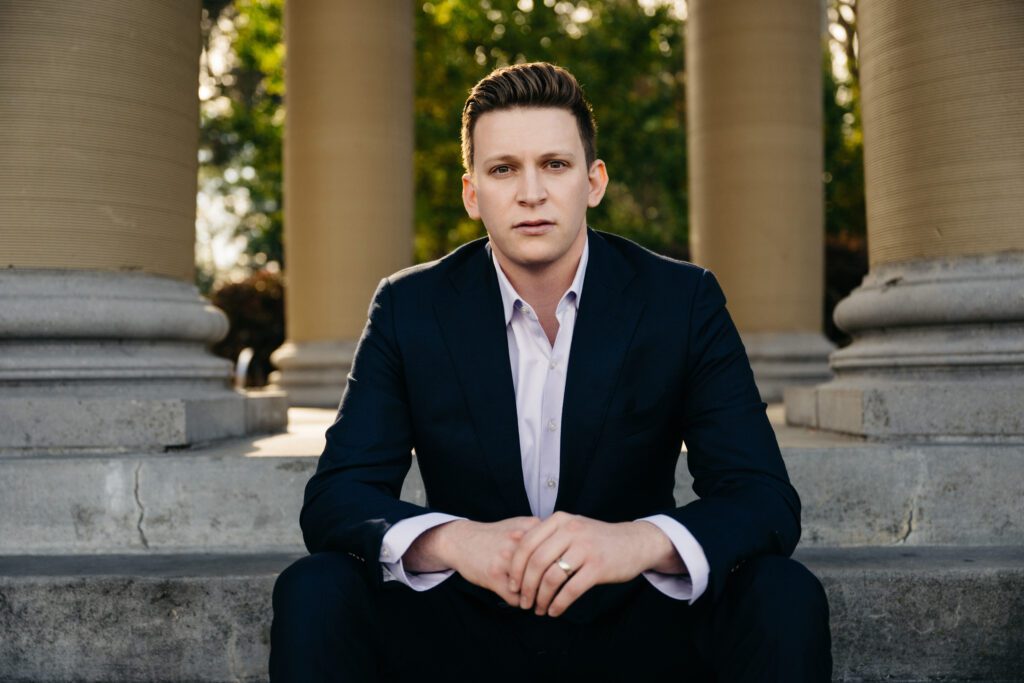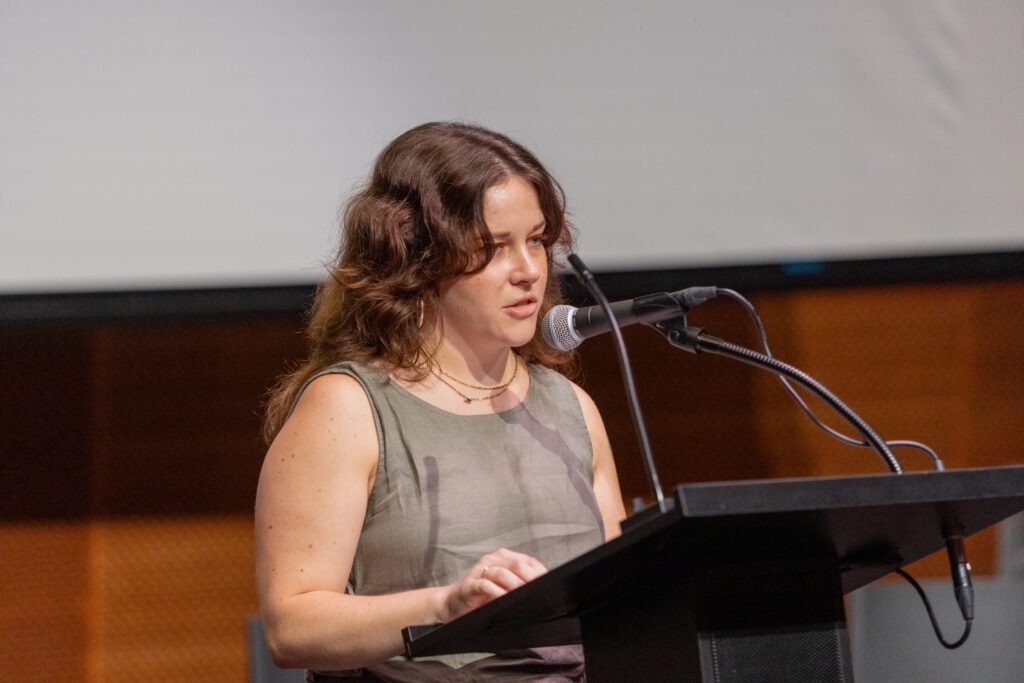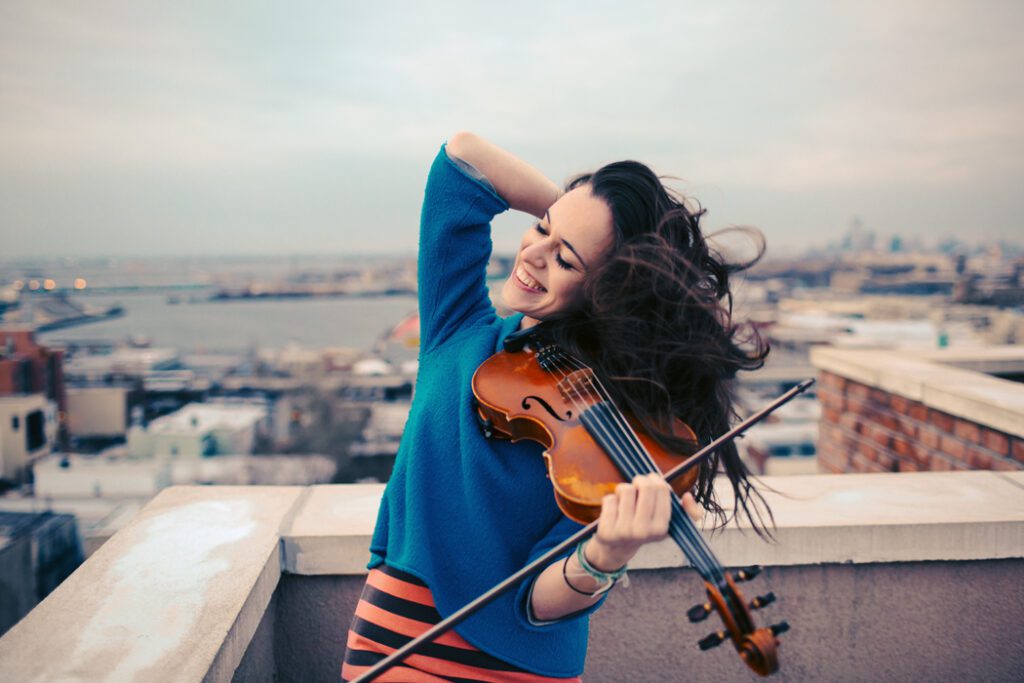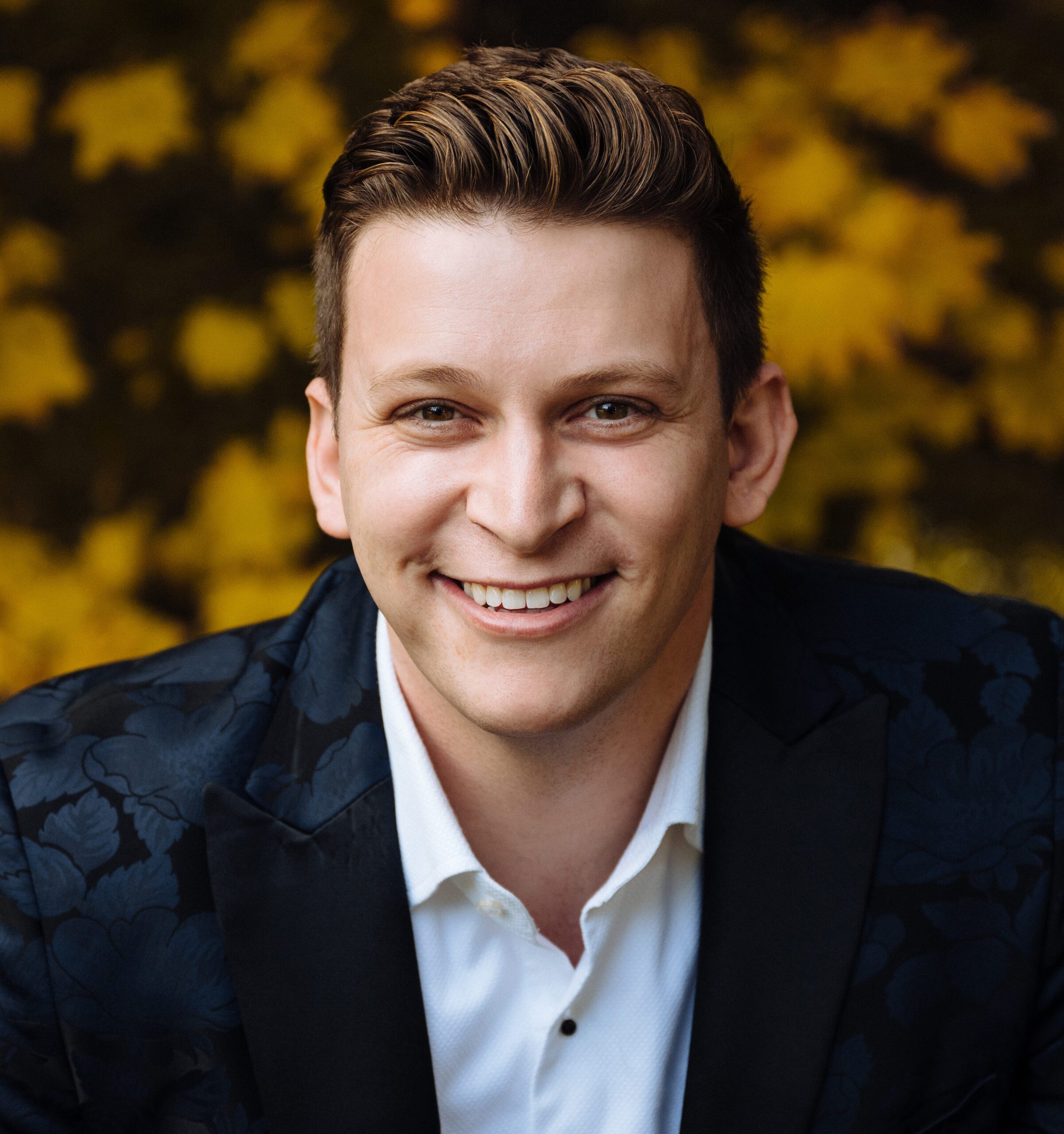
Interview by Chloe Yutong Yang ’26
On April 19-20, 2024, countertenor Aryeh Nussbaum Cohen ’15 will make a triumphant return to his alma mater, Princeton University, for a historic performance as The Angel in Elgar’s Dream of Gerontius. This marks Aryeh’s first time back at Princeton since his graduation in 2015, and he will be the first countertenor to ever perform this demanding work in the Princeton University Orchestra and Glee Club’s annual Walter L. Nollner Memorial Concert at Richardson Auditorium.
We sat down with Aryeh to discuss his unconventional path to a singing career, his formative experiences at Princeton, and what it means to him to return to campus for this groundbreaking performance.
Can you highlight some of your academic experiences at Princeton, like how you eventually made the decision to study History and vocal performance?
I did not consider a conservatory because I was originally planning to major in the School of Public and International Affairs, and maybe then go to law school or into policy work. It was really after some formative experiences I had at Princeton, like winning a free ticket from the music department to see a performance at the Metropolitan Opera (my first time seeing an opera!) that I decided I wanted to try singing as a career.
I had just declared my major during the spring of my sophomore year, but I came back in the fall of junior year knowing I wanted to make the most of Princeton’s resources to build a foundation in this career I was going to pursue. That’s why I changed my major to History — to study the history behind the music I had fallen in love with. Vocal performance was an obvious pairing, and Judaic Studies I was able to add since I had taken enough cross-listed courses.
How did Princeton help prepare you for a career in the arts? Can you talk about some of the ensembles you were part of or classes you took?
More than anything, the independent life of a professional musician is something a Princeton degree prepares you well for, in terms of being self-motivated, organized and keeping track of everything you have going on.
Specifically at Princeton, there were a couple of people who really invested in me as a musician and artist and helped lead me into this career before I knew it was possible for me. First and foremost was Gabriel Crouch, who from the very beginning helped me see the opportunities available to me, like the Martin A. Dale ‘53 Summer Award.
The other influential person was Wendy Heller in the music department, who helped me develop that academic and historical understanding behind the music. I took a graduate course with her and did projects under her guidance. I’ve even called on her expertise in my professional career when preparing roles, like last year as I prepared to debut at the Bayerische Staatsoper in Munich in Cavalli’s La Calisto, a piece she is one of the world’s foremost experts on!
I was in Glee Club and Chamber Choir for most of my time at Princeton, and I took many music courses and performed in several opera productions. My time in the ensembles was very formative and special. The traveling we did really helped open my eyes to the world I was going to see in this career.
Who else would you like to acknowledge in terms of mentors and influences at Princeton?
In addition to Gabriel and Wendy, my voice teacher at Princeton, David Kellett, was very influential. I only started taking weekly lessons because of the financial support I received through the Glee Club, and that was crucial for my development.
I also must acknowledge Gabriel’s wife Christie Starrett, who connected me with my current manager Bill Palant. From the first time they heard me sing, they told Bill about me, he came to hear me at Princeton, and that put me on the path to the career I have today. It really all started with Gabriel, Christie, David, Wendy and the opportunities Princeton gave me. Without those experiences and support, I don’t think I would have this career today.
Beyond academic studies, what else at Princeton gave you “something to sing about” and depth as an artistic interpreter?
The heavy research components of my Princeton courses really trained me in the skills I still use to build fully fleshed-out, three-dimensional character portrayals. Critics have consistently praised me for my dramatic depth, which comes directly from that Princeton ethos of studying a topic from all angles. My time there made me a multi-faceted person with life experiences to imbue the music with richer meaning.
What are you most excited about performing the Dream of Gerontius, and how are you preparing for a work no countertenor has done before?
This was Gabriel’s vision – he’s had me in mind for this piece since he first heard my prescreening tape back when I applied to Princeton. We’ve been trying to make it work for a few years and I’m thrilled we’re finally able to do it together.
It’s a spectacular work that I’ve loved getting to know over the past few months. It’s so lush, dramatic and beautiful — truly a masterpiece. I’m excited to introduce the Princeton audience to this incredible piece that is so well-known in England but rarely done in America.
I love singing things no countertenor has done before. It feels special to me to bring my own sound to it without any expectations or burden of emulation. My voice is a bit different from many countertenors, who have a more intimate and delicate sound. My voice can be bigger, rounder and warmer, closer to a mezzo-soprano — which allows me to sing repertoire like this that is not normally associated with countertenors. And the angelic quality inherent in the Countertenor voice should be a terrific pairing with this role!
In preparing, I don’t listen much to recordings because I want it to truly be my own sound and interpretation. I sit at the piano, plunk out my notes, sing along and find the piece within myself, like I do with everything.
What upcoming engagements are you most excited about? Are there any dream roles you’d like to perform that you haven’t yet had the chance to?
After Princeton, I go back to the Glyndebourne Festival to perform the role of Julius Caesar in a legendary production by Sir David McVicar. It was actually the first Handel opera I ever saw, at the Met during my time at Princeton. So getting to embody Caesar in this production at Glyndebourne, a place with such a special history of Handel performances, is truly a pinch-me moment.
In the fall, I’ll be part of my first world-premiere opera, in Brussels at La Monnaie. It’s a work called Fanny and Alexander, based on the Ingmar Bergman film, and I’ll be part of an amazing cast with artists I greatly admire, like Thomas Hampson, Anne Sofie von Otter, and Sasha Cooke.
Next season, I’m very excited to be doing a recital tour that is just starting to be announced. Carnegie Hall is the only one formally announced so far, but I’ll be making my solo recital debuts there, at the Kennedy Center, and other places. Getting to sing the pieces that resonate most deeply with my musical soul in these special venues is something I’m really looking forward to.
So yes, lots of exciting things are coming up that I feel very fortunate to have the opportunity to do. As for dream roles, I’m always excited to explore new repertoire, and would love to continue expanding the possibilities of what a countertenor can sing.
This performance marks a full-circle moment, returning to the Richardson stage. What are you most excited about?
It’s incredibly special returning to the very stage where I first found my footing as a classical singer. After recent debuts at places like the Met, Carnegie Hall, and top houses worldwide, coming back to perform at Princeton is very emotional. This hall is where it all started for me, so it will be an extraordinarily meaningful homecoming. The musical memories here, from choir tours across Europe to being part of student operas, instilled my passion for travel and experiencing the world – a driving force in this career.
***
Don’t miss this opportunity to see Aryeh Nussbaum Cohen ’15 make history in his Princeton homecoming performance of Elgar’s Dream of Gerontius with Princeton University Orchestra and Princeton Glee Club on April 19-20, 2024 at Richardson Auditorium. Learn more about the concert here. It promises to be an unforgettable event showcasing Princeton’s enduring influence on this rising star’s meteoric career.
In Other News

2025 Class Day remarks by key note speaker, Nick DiBerardino ’11
Jun 4, 2025
By: Nick DiBerardino ’11, Provost and Dean of Curtis Institute of Music; Chair of Composition Studies; Director of Curtis New Music Ensemble Hello class of 2025! I’m Nick DiBerardino, class …

2024 Class Day remarks by key note speaker, Molly Bolten ’14
Jun 10, 2024
By Molly Bolten ’14 Good afternoon Princeton Music graduates! Please excuse my hoarse voice—I’ve been shouting over very loud music for the last three days. As Professor Snyder told you, …

Brittany Haas (‘09), Princeton’s Fiddler
Mar 15, 2024
Brittany Haas’s ’09 journey at Princeton took many diverse pathways. An Evolutionary Biology Major with a Music Performance Certificate, she navigated student life focusing on primatology, while simultaneously delving into an array of musical genres and cultures. Learn more in our interview with Brittany!

